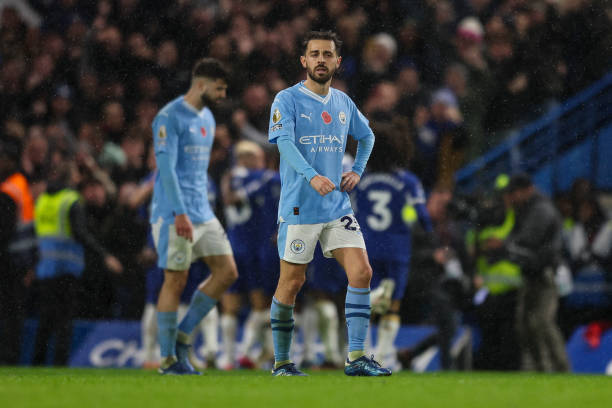Manchester City midfielder Bernardo Silva has voiced frustration over the Premier League’s scheduling, claiming his side were unfairly disadvantaged in Sunday’s 1-1 draw with Arsenal at the Emirates Stadium. Gabriel Martinelli’s stoppage-time goal rescued a point for the Gunners, leaving City to lament what they say was an unbalanced fixture calendar.
City had only 66 hours to recover from their 2-0 home victory over Napoli in the Champions League on Thursday, while Arsenal enjoyed a longer recovery period after a 2-0 win over Athletic Club in Bilbao on Tuesday. Silva believes the short turnaround left the City squad physically compromised.
“It is not fair to play one of these games like this. It is just not right,” Silva told reporters. “The reality is we cannot come into one of the most important games in the season with such a disadvantage, in terms of rest. I wasn’t feeling in a perfect condition to play like this, and people who have not played at the highest level don’t know how it feels to play a game like this. You need to be at your best condition.”
Silva’s comments echo those of manager Pep Guardiola, who admitted his squad was “incredibly tired” against Arsenal. Guardiola has previously criticised Premier League scheduling, noting in January that English teams face tougher challenges in Europe because domestic fixtures often coincide with key Champions League games.
“The schedule always puts English teams in difficult situations during the important stages of the European season,” Guardiola said at the time. Sunday’s clash reinforced that point, as City struggled to match Arsenal’s intensity in the final minutes, ultimately conceding a late equaliser.
Silva, who made 62 appearances for City and Portugal last season, clarified that he does not believe the league intentionally disadvantages any team. “I don’t think that they are trying to make us lose a game. It could happen to Arsenal or Liverpool in a few months,” he said. “But when you are playing an Arsenal v City, or a City v Liverpool, or a Liverpool v Arsenal, you need to have a bit of common sense and understanding of these situations.”
Fixture Pressure and Player Fatigue
The issue of fixture congestion is not new. Clubs involved in multiple competitions—domestic league, domestic cups, and European tournaments—regularly face tight schedules. However, Silva’s remarks underline the fine margins at the top level, where fatigue can influence outcomes in crucial games.
City’s squad depth was tested once again, and despite Guardiola rotating players, the combination of travel, training, and competitive matches clearly took a toll. Analysts note that such short recoveries increase the risk of injuries and affect performance levels, making late goals and draws more likely against well-rested opponents.
The Premier League Context
English football’s calendar is notoriously congested, with Premier League clubs often playing three matches a week. While this generates revenue and maintains fan engagement, top players frequently voice concerns over recovery time. Silva’s comments add to the chorus of criticism and fuel ongoing debate about how fixture scheduling can affect competitive fairness.
The draw against Arsenal also carries wider implications. City, aiming to defend their Premier League title, cannot afford points dropped in crucial fixtures. With rivals like Arsenal and Liverpool pushing at the top, even a single draw or loss can significantly impact the title race.
Looking Ahead
City’s focus will now shift to the upcoming matches in both domestic and European competitions. Guardiola will likely have to manage player workloads carefully to avoid fatigue-related dips in performance. Silva’s plea for “common sense” scheduling highlights the balancing act the Premier League faces: maintaining a demanding calendar while ensuring fairness in key fixtures.
For now, Manchester City must contend with the frustration of a late equaliser and the physical toll of a packed schedule. Silva’s comments serve as a reminder that, beyond tactics and talent, recovery and rest are essential in modern football, especially when the stakes are highest.









